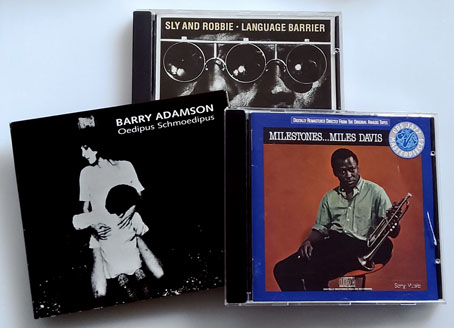
I listen to music all the time when I’m working but it’s not always a good idea to give new music an airing when you’re also concentrating on new work. What often happens on these occasions is that the album will fail to make an impression and end up being laid aside in favour of more familiar sounds, which is what happened to the copy of Milestones (1958) by Miles Davis that I bought last year in a charity shop. Listening to it again this week provoked a “Wow!” response as well as making me realise that I’d heard the tune of the fourth track, Miles, somewhere before. Miles, or Milestones as it’s confusingly also known, is covered by Barry Adamson on his 1996 album, Oedipus Schmoedipus, a simpler version but still jazzier than everything else on the album. I’d always suspected that Adamson was referring to Miles Davis with the title but since I’d never looked at the writing credits until this week I didn’t make the connection. Davis had a habit of naming new pieces of music after people he knew—John McLaughlin, Billy Preston, Mtume, producer Teo Macero, etc—so Miles (as opposed to Milestones) can be taken as an early example of the habit even though it refers to him and also doubles as a reference to measurement rather than a person.
The same title, but not the same piece of music, appears on a 1985 album by Sly & Robbie, Language Barrier, the track in this case being a renamed reworking of Black Satin from Miles Davis’s On The Corner album. Language Barrier in turn was produced by Bill Laswell who later remixed the original Black Satin for his excellent compilation/reconstruction of Davis’s electric period, Panthalassa, and who may have suggested that Sly & Robbie record their own version of the Davis piece. Whatever its origin, Miles (Black Satin) is credited to “B. Laswell, M. Davis, R. Shakespeare & S. Dunbar” which brings us back to Barry Adamson whose Miles has a similar credit at Discogs (but not on my CD…) although Laswell is now (bizarrely) “William Laswell”. I still don’t know what connection Laswell or Sly & Robbie have with Adamson’s track, unless it’s a Discogs error or contains a sample I’ve missed, but the ghost of M. Davis might at least be satisfied that he was influencing popular music after so many years on the outside looking in. Always miles ahead. And that’s the title of another Davis album I’ve yet to acquire…

My favourite Sly & Robbie album is the one with Howie B – Drum n Bass Stripped to the Bone. Nordub with Vladislav Delay and Nils Petter Molvaer is pretty good too. I hadn’t heard of Language Barrier, on YouTube it sounds really 80s, will give it a proper listen though. Was never a fan of the Laswell treatments of Miles. Have pretty much everything by Mr Davis, but then my son’s middle name is Miles and my cat is called Davis…
Language Barrier is very 80s in its drum and keyboard sounds, and also seems to have been produced by whoever was in the studio at the time; Bob Dylan apparently plays harmonica on one track. I prefer the album that Laswell did with the duo after this one, Rhythm Killers, which is closer to their reggae roots and has Bootsy Collins among its guests.
Laswell is heavily indebted by the electric Miles period, as well as that era of jazz in general, which is fine with me since it’s my favourite jazz era as well. He produced several albums by Herbie Hancock, of course, but he was also working with Wayne Shorter and Pharoah Sanders in the 1990s. I still wonder what Miles Davis would have thought of Panthalassa; he was very open to Teo Macero splicing together his recordings so I suspect that he might have liked it.
I love the first two Laswell-produced Hancock albums. I’m going to listen to Panthalassa again for the first time in a decade or two, and see what I think of it now. My favourite Laswell works were the first three Material albums, his debut album Baselines and Low Life with Brotzmann. I’m not sure Miles would have liked Panthalassa as Miles didn’t like looking back. Oh and the name of my first cat 30 years ago? Laswell.
Yeah, it’s probably more likely that MD would look askance at people dwelling on his recordings from the 70s as much as he would people in the 70s asking why he no longer played like he did on Kind Of Blue.